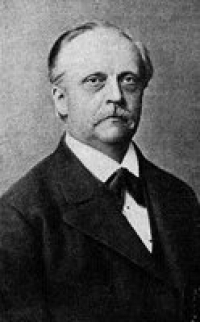Helmholtz, Hermann Ludwig Ferdinand von
Hermann Ludwig Ferdinand von Helmholtz (1821-1894), German physicist who first extended Joule's results to a general principle, now known as law of the conservation of energy. Helmholtz described the relationship between mechanics, heat, light, electricity, and magnetism as manifestations of a single force. He presented a mathematical proof for this in Über die Erhaltung der Kraft (On the Conservation of Force, 1847). Helmholtz's use of the word "force" corresponds to what later became known as energy. Helmholtz had wide-ranging interests: in 1851, he invented the ophthalmoscope, an instrument that was used to look into the human eye; he also studied electromagnetism, earth science, and the physiology of the senses. A large German association of research institutions, the Helmholtz Association, is named after him.
Further Reading
Helmholtz Biography (University of St. Andrews, Scotland)
Helmholtz Association Homepage
